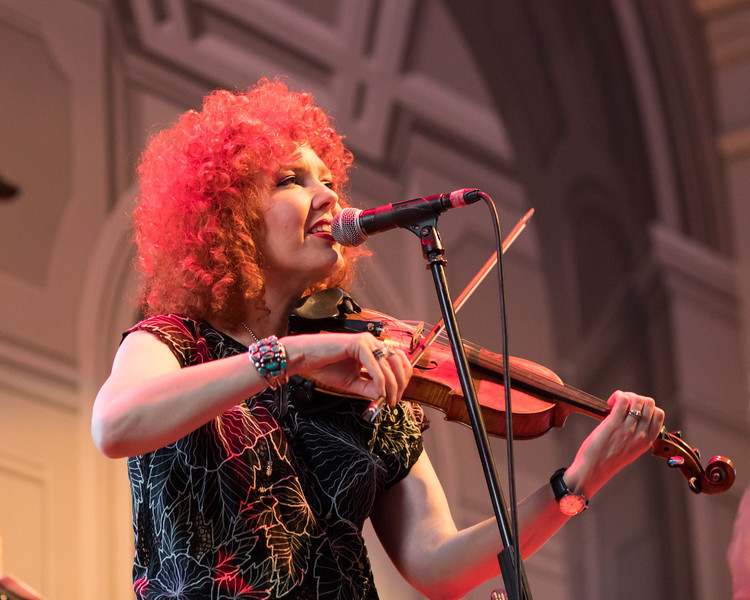Steve Earle—singer/songwriter, bandleader, actor, author and activist—brought his band the Dukes to Edgartown last week for a powerful two-hour performance that had the audience on its feet and cheering.
The Old Whaling Church stage has held larger musical ensembles—the Minnesingers, Vineyard Haven Band and Island Community Chorus come to mind—but seldom so many electrified instruments at once. Among Mr. Earle and the five other members of his band, there were more than a dozen six-stringed guitars, at least two mandolins and two violins, a bass guitar and an upright bass, a pedal steel guitar and an accordion.
An accompanying arsenal of amplifiers and stand microphones filled the 1843 Methodist sanctuary with almost more sound than it could hold—enough that fans without tickets were able to listen to the concert from outside the building.
A few years ago, the volume would have been even higher. Mr. Earle recently told Guitar Player magazine that he used to have eight 10-inch speakers in his Peavey amplifiers.
“That was stupid loud, but it sounded incredible,” the three-time Grammy winner said, in an interview published in the magazine’s April issue. “I don’t need to get any more deaf than I already am, so I’ve backed off to four 10s.”
Most of the guitars on stage were electric and many belonged to the Texas-born, Brooklyn-based alt-country duo the Mastersons, composed of lead guitarist Chris Masterson and his wife, violinist Eleanor Whitmore. Both of them double on mandolin and sing, and Mr. Masterson changed instruments between songs throughout the night.
The Mastersons first toured with Mr. Earle in 2011 and joined bassist Kelly Looney, drummer Brad Pemberston and pedal-steel guitarist Ricky Ray Jackson for the bandleader’s most recent recording, Guy, as well as on this tour in support of the album.
While paying tribute to the revered singer-songwriter Guy Clark, Mr. Earle and the Dukes also played his own compositions, including Guitar Town, Copperhead Road and Hard-Core Troubadour, at the Whaling Church. But throughout the evening, Mr. Earle returned to the music and the legacy of Mr. Clark, his musical mentor, who died of cancer in 2016. The two met in Nashville the early 1970s, after a young Mr. Earle had thumbed his way from San Antonio to start his music career.
“I didn’t know you could get from Texas to Tennessee any other way than hitchhiking,” Mr. Earle told the Vineyard audience.
Mr. Clark, he continued, proved to be his teacher, his champion and his friend—the only person in the world who was allowed to call him Stephen.
And Mr. Clark was a fountain of remarkable songs, 16 of which Mr. Earle and the Dukes have recorded on the new album. In Edgartown, the band played Mr. Clark’s carefully drawn and deeply felt ballads like Desperadoes Waiting for a Train, reflective story-songs like The Randall Knife and rollicking numbers like Heartbroke, which had Vineyard audience members dancing in the church aisles.

Mr. Earle’s own songs also tell stories, some set in the American past.
“I spent a lot of time in the library doing research,” he told the Island audience. “It’s a lot like the internet, only slower.
“When you’re 19 and 20, your historical pieces are a lot more credible than your love songs are,” he continued, before performing his early gunfighter ballad Tom Ames’ Prayer.
After opening the show playing one of his Telecaster-style guitars built by electric luthier James Trussart, Mr. Earle switched to acoustic guitar for much of the concert. He also played mandolin on several tunes, and deployed a rack harmonica on Fort Worth Blues.
As the concert neared the end of its second hour, Mr. Earle and his band finally left the stage, but quickly returned as the audience cheered, clapped and stamped for more.
In an encore for motorheads, Mr. Earle sang the first verse of Bruce Springsteen’s Racing in the Street, then went into his own car song Sweet Little 66 (“she ain’t too good on gasoline, she burns a little oil/But she was built by union labor on American soil”) before rocking out on Springsteen’s Pink Cadillac.
The last song of all was Guy Clark’s Old Friends, a fitting send-off to a concert imbued with Mr. Earle’s undying affection for his comrade and teacher.
“Old friends shine like diamonds/Old friends you can always call/Old friends, Lord you can’t buy ’em/You know it’s old friends after all,” he sang, before inviting the audience to join in “one more time for Guy.”





Comments
Comment policy »